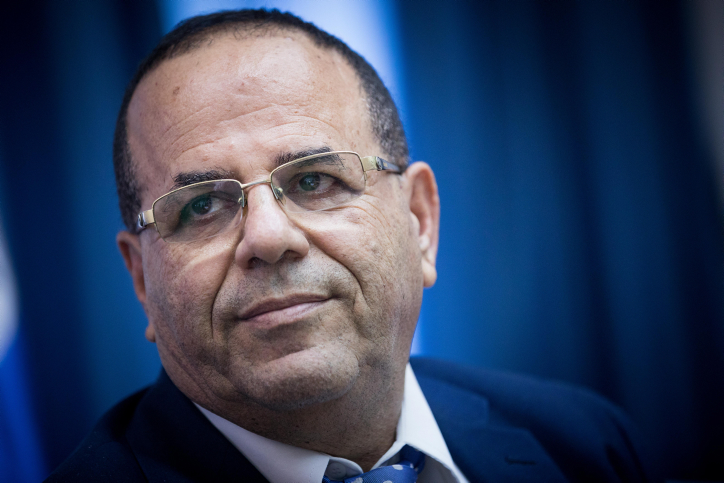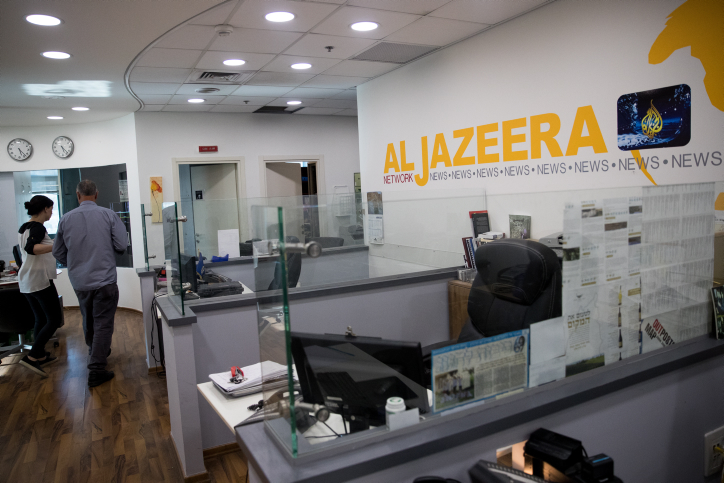Communications Minister Ayoub Kara held a press conference at which he promised to ‘close’ Al Jazeera. He doesn’t exactly have that type of authority, let alone the ability.
By Moshe Ronen

Israel’s new communications minister, Ayoub Kara, declared this week that he would act to shut down Al Jazeera’s operations in Israel. Speaking at a press conference on Sunday, Kara explained that he is the only minister in the Israeli government whose mother tongue is Arabic, and therefore he is the only one who understands the channel’s Arabic-language broadcasts. Prime Minister Benjamin Netanyahu wasted no time praising Kara for working to shutter the station.
And so it was that Israel followed in the footsteps of four Arab states — Egypt, Saudi Arabia, Bahrain, and the United Arab Emirates — who themselves shuttered Al Jazeera’s offices in their respective countries earlier this summer, after severing all ties with Qatar, where the station is headquartered.
But the honorable communications minister seems to have misunderstood a few things. A communications minister in a democratic country is not actually in charge of the media, and he or she cannot just “close” Al Jazeera, as some less-democratic neighboring countries have done. The state’s influence over Al Jazeera can be broken down into two areas: controlling the ability of its journalists to report inside Israel, and control over its broadcasts from within Israel’s borders.
Read +972 Special Coverage: Press Freedom & Censorship in Israel
Baseless declarations and zero authority
In practice, the State of Israel has no legal tools that allow it to limit Al Jazeera’s Israeli-citizen journalists to do their work as long as they don’t violate some other law. Walid al-Omari, Al Jazeera’s Jerusalem bureau chief, is an Israeli citizen.
With regards to foreign correspondents, Israel could in theory limit or reject their work visa applications. Journalists’ visas in Israel are generally granted to journalists who have Government Press Office (GPO) accreditation. The GPO, which has been taken to court over the matter no small number of times, does not just arbitrarily cancel press accreditations. There are regulations for these things. In general, GPO press cards are only canceled when Israel’s internal security service, the Shin Bet, declares a journalist to be a security threat. In rarer cases, the GPO has canceled accreditation to journalists for other reasons, like the case of Dutch journalist Derk Walters.
The GPO has not canceled the press accreditation of a single Al Jazeera journalist, according to Haaretz. The GPO did ask the Shin Bet for an expert opinion on the matter, but it is not reasonable to expect the Shin Bet to change its security assessment just because of a press conference by the communications minister. Either way, even if the Shin Bet does ultimately Kara’s request, GPO accreditation cannot be canceled without a formal hearing, according to the GPO’s own regulations.
Communications Minister Kara also announced that he is planning on asking Israel’s public security minister, Gilad Erdan, “to exercise his authority” to close Al Jazeera’s offices in Israel. I’m not aware of any authority that the public security minister has to shut down media outlets. Leftover laws from the British Mandate period do give the interior minister the authority to shut down a (printed) newspaper, but that particular power was stricken a few weeks ago by the Knesset. We at the Union of Journalists in Israel participated in the Knesset committee hearing where canceling that regulation was discussed.
A toothless threat
Al Jazeera’s broadcasts come into Israeli homes in two different ways: via private Arab satellite feeds, and via Israeli television providers. The communications minister has no control at all over the private satellite feeds; perhaps Egyptian or Saudi officials have that power, but not in Israel. With regards to Israeli television providers — satellite, cable, and perhaps newer internet-based providers — the communications minister has a bit more control, on account of the Satellite and Cable Council being a part of his government ministry.
As far as we know, the Satellite and Cable Council has not held a hearing or discussion on the matter. However, its power to wade into this matter is limited, considering that the newer television providers do not use cable or satellite to beam programs and stations into Israeli homes but rather broadband, over which the Satellite and Cable Council has no authority.
Communications Minister Kara also declared that he plans to advance legislation on the matter. But as we know all too well, the legislative process is long and complicated, not to mention subject to judicial review. Due to current Knesset recess and upcoming Jewish holidays, that multi-stage and inter-ministerial process could only even begin in a few months’ time. I can’t imagine anyone is interested in initiating such a process, which is more fitting for a country like Turkey.
In order to understand what exactly Kara’s declaration meant, I tried to get a hold of the Communications Ministry spokesperson and the spokesperson for Kara’s office. They aren’t picking up their phones. It seems that, at least for the time being, that Kara’s declaration and press conference was all hot air.
Moshe Ronen is the free press coordinator for the Union of Journalists in Israel. This article was first published in Hebrew on Local Call. Read it here.

